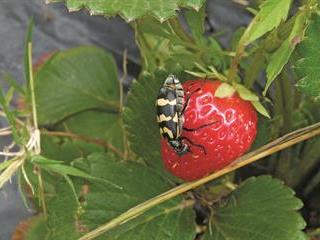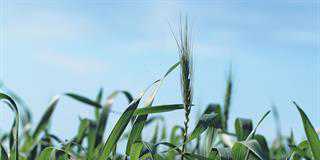
“The strawberries have been our saving grace this year,” says Mandy Aukamp of the Berrynice Berry Company near Molteno in the Eastern Cape.
Mandy and her team planted the strawberries as a trial alongside their main enterprise, raspberries. The original plan was to sell the strawberries locally if the trial proved successful. But the strawberries have achieved more than that – they have helped the company pull through the drought gripping the area, and proved themselves a worthy commercial crop in their own right.
A long dry season
The severe drought currently afflicting the Molteno district and other parts of the northern Eastern Cape has hit many farmers hard. The region’s annual average rainfall is 400mm, but past months have seen the rainfall fall far below the norm. Last year, moreover, the situation was exacerbated by devastating veld fires.
In the face of a dwindling water supply, Mandy was forced to take a strategic gamble: to focus on their non-commercial strawberry crop rather than their primary raspberry crop. With the irrigated raspberries still unable to produce any significant harvest, the decision appears to be paying dividends for the small-scale raspberry and jam manufacturing company.
A suitable climate for raspberries
Ironically, it was the climate that first inspired Mandy and her husband Hannes to consider the small-scale production of raspberries on their farm, Langlaagte, located 25km outside Molteno (see Farmer’s Weekly, ‘Nice – Berrynice’, 15 July 2011, pg 54). In 2002, while struggling to remove a particularly resilient bramble bush, Mandy carried out some research which pointed to the area’s suitability as a raspberry growing area.

Mandy Aukamp of the Berrynice Berry Company shows the height at which the raspberry bushes that were irrigated grew to this season in relation to those that have relied on rainfall only.
In late 2008, Mandy launched her first trials in a tunnel constructed on the farm, and identified three primocane raspberry varieties that proved most suitable for the conditions. The farm’s soil pH was neutral, and the region experienced more than 200 cold units per year, which is conducive to raspberry production.
As a means of providing employment for 12 families that were living on the farm, Mandy and Hannes decided to form the Berrynice Berry Company (Pty) Ltd, of which 49,17% would be owned by the Langlaagte Berry Agricultural Primary Co-op (now with 11 of the farm dwellers as members), and the remaining share owned by Junglevine Investments cc, a nursery specialising in raspberry plant propagation.
With the legal entities in place, and the farm dwellers eager to participate, the operation applied for funding from the European Union, and in 2010, with the help of the Thina Sinako Provincial Local Economic Development Support Programme, they secured a grant of R3,5 million to begin production.
Prioritising a non-commercial crop
Having started out with just 1 000 raspberry plants, the operation now includes approximately 50 000 plants in a 2ha hydroponic raspberry growing facility on the farm. Hannes also farms 120 head of Angus stud cattle and 2 000 sheep.
Generally, they harvest 12t of raspberries per season. The facility consists of tunnels covered in 40% shade cloth, and is shielded from strong, prevailing winds with a windbreak of thicker 80% shade cloth.
The raspberries occupy just over three-quarters of the facility and the strawberries the remainder. The raspberry plants normally start breaking dormancy by the end of August, and the first crop follows in due course. Due to the drought, however, they were forced to irrigate with borehole water, and the crop failed to materialise. When their second borehole ran dry, Mandy and her team changed tack.
“We realised we couldn’t water them all, so we decided to water the strawberries and what raspberries we could, leaving the remainder for when the rains come again,” she says.
At the time of writing, the irrigated raspberries were a metre taller than the others, but had not yet produced much fruit. The strawberry crop, by contrast, was producing the “most beautiful” and “wonderfully sweet” fruit, according to Mandy.
Each strawberry plant is surrounded by a small mound of soil mixed with pine bark and manure; this ensures a neutral soil pH. The plants are drip-irrigated by pipes underneath the soil. Strawberries are usually planted under black plastic with a silver underlining, but, in an attempt to save costs on what was to be a non-commercial crop, Mandy decided to use normal black ground sheeting instead.
She attributes the strawberries’ success to the plastic covering, which was significant in retaining moisture that would otherwise have evaporated in the dry conditions, and the cultivar she purchased under licence from the Plant Science Institute in George. She is currently harvesting in excess of 50kg/day (200 punnets/ day) to be sold fresh on local markets.While Mandy asserts that they are not picking on a commercial scale, the high local demand and sales have kept them going.
A crop for the future
The strawberries’ durability during the area’s worst drought in 50 years has inspired Mandy to include the crop as part of the company’s commercial produce for next year’s harvest. She is convinced that strawberries are hardier than raspberries. Another advantage they offer is that the plants are considerably smaller than raspberry bushes, thus allowing more plants to be cultivated in a given area.

Although some raspberry bushes have produced a crop, the majority, including those that were irrigated, have yet to bear fruit.
“A raspberry’s root system is as deep as the plant is tall, so it needs a lot more water and space. Raspberries also need to be chilled to 4°C a few minutes after picking, and generally have a four-day shelf life,” she explains.
Despite the drought and the raspberries’s crop failure this season, Mandy has no plans to abandon raspberries. She maintains that the company remains primarily a raspberry producer and jam manufacturer, and the strawberries will enhance what the company already does so well. She therefore intends growing strawberries commercially alongside the raspberries to mitigate the risk of further dry spells, and is looking to double her strawberry crop next season.
Phone the Berrynice Berry Company on 087 550 1184 or email [email protected].













